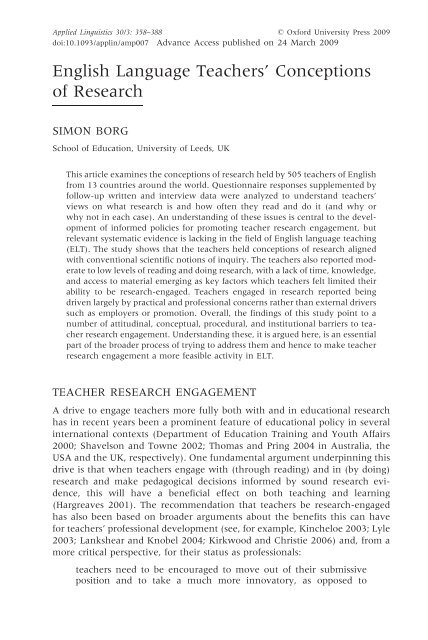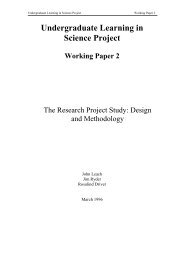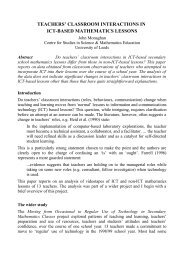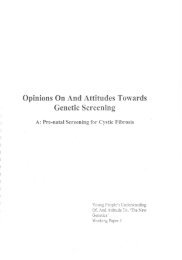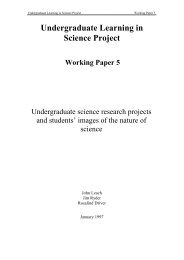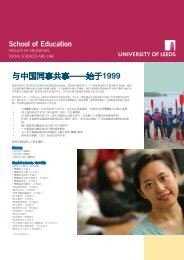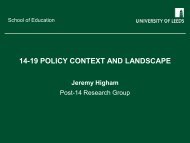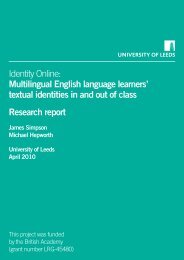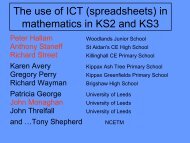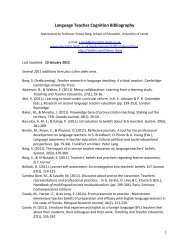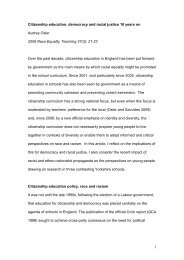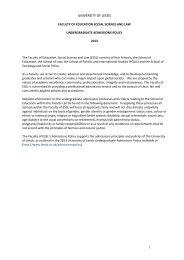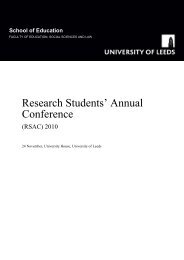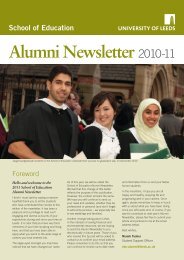English Language Teachers' Conceptions of Research - School of ...
English Language Teachers' Conceptions of Research - School of ...
English Language Teachers' Conceptions of Research - School of ...
You also want an ePaper? Increase the reach of your titles
YUMPU automatically turns print PDFs into web optimized ePapers that Google loves.
Applied Linguistics 30/3: 358–388 ß Oxford University Press 2009doi:10.1093/applin/amp007 Advance Access published on 24 March 2009<strong>English</strong> <strong>Language</strong> Teachers’ <strong>Conceptions</strong><strong>of</strong> <strong>Research</strong>SIMON BORG<strong>School</strong> <strong>of</strong> Education, University <strong>of</strong> Leeds, UKThis article examines the conceptions <strong>of</strong> research held by 505 teachers <strong>of</strong> <strong>English</strong>from 13 countries around the world. Questionnaire responses supplemented byfollow-up written and interview data were analyzed to understand teachers’views on what research is and how <strong>of</strong>ten they read and do it (and why orwhy not in each case). An understanding <strong>of</strong> these issues is central to the development<strong>of</strong> informed policies for promoting teacher research engagement, butrelevant systematic evidence is lacking in the field <strong>of</strong> <strong>English</strong> language teaching(ELT). The study shows that the teachers held conceptions <strong>of</strong> research alignedwith conventional scientific notions <strong>of</strong> inquiry. The teachers also reported moderateto low levels <strong>of</strong> reading and doing research, with a lack <strong>of</strong> time, knowledge,and access to material emerging as key factors which teachers felt limited theirability to be research-engaged. Teachers engaged in research reported beingdriven largely by practical and pr<strong>of</strong>essional concerns rather than external driverssuch as employers or promotion. Overall, the findings <strong>of</strong> this study point to anumber <strong>of</strong> attitudinal, conceptual, procedural, and institutional barriers to teacherresearch engagement. Understanding these, it is argued here, is an essentialpart <strong>of</strong> the broader process <strong>of</strong> trying to address them and hence to make teacherresearch engagement a more feasible activity in ELT.TEACHER RESEARCH ENGAGEMENTA drive to engage teachers more fully both with and in educational researchhas in recent years been a prominent feature <strong>of</strong> educational policy in severalinternational contexts (Department <strong>of</strong> Education Training and Youth Affairs2000; Shavelson and Towne 2002; Thomas and Pring 2004 in Australia, theUSA and the UK, respectively). One fundamental argument underpinning thisdrive is that when teachers engage with (through reading) and in (by doing)research and make pedagogical decisions informed by sound research evidence,this will have a beneficial effect on both teaching and learning(Hargreaves 2001). The recommendation that teachers be research-engagedhas also been based on broader arguments about the benefits this can havefor teachers’ pr<strong>of</strong>essional development (see, for example, Kincheloe 2003; Lyle2003; Lankshear and Knobel 2004; Kirkwood and Christie 2006) and, from amore critical perspective, for their status as pr<strong>of</strong>essionals:teachers need to be encouraged to move out <strong>of</strong> their submissiveposition and to take a much more innovatory, as opposed to
S. BORG 359implementary, role in curriculum development. One way to do thisis to adopt the perspective <strong>of</strong> the researcher. (Gurney 1989: 15)Stimulated by this interest in encouraging teachers to be research-engaged,one strand <strong>of</strong> inquiry to emerge has focused on examining what teachersactually think about research (Shkedi 1998; Everton et al. 2000; Evertonet al. 2002; McNamara 2002b; Ratcliffe et al. 2004). The rationale for suchwork has been that initiatives to promote teacher research engagement aremore likely to succeed if they are based on an understanding <strong>of</strong> teachers’conceptions <strong>of</strong> research and <strong>of</strong> the role research plays in their work. A furtherrelated strand <strong>of</strong> inquiry, particularly in the UK, has focused on the notion <strong>of</strong>research-engaged teachers and schools (Ebbutt 2001; Handscomb andMacbeath 2003; Hemsley-Brown and Sharp 2003; Barker 2005; Sharp et al.2005; Sharp 2007). One collective finding to emerge from this work is thatorganizational and institutional factors, and not just teachers’ individual attitudes,can also exert a powerful influence on the extent to which teachers canbe research-engaged.An interest in teacher research engagement is also evident in the literatureon <strong>English</strong> language teaching (ELT), though in this field only a limited number<strong>of</strong> empirical studies <strong>of</strong> teachers’ conceptions <strong>of</strong> research exist (in contrast to amuch wider body <strong>of</strong> work which advises teachers on how to do research—e.g. Allwright and Bailey 1991; Nunan 1992; Freeman 1998; Burns 1999;Brown and Rodgers 2002). McDonough and McDonough (1990) surveyedthe views <strong>of</strong> research <strong>of</strong> 34 teachers <strong>of</strong> <strong>English</strong> as a foreign language, whileBrown et al. (1992) report a survey <strong>of</strong> 607 members <strong>of</strong> an international associationfor ELT pr<strong>of</strong>essionals (although it is not clear what proportion <strong>of</strong> thissample were teachers, as opposed to academic researchers and university lecturers).These studies, echoing those outside ELT, reported notions <strong>of</strong> researchclosely tied to quantitative and statistical methods and a general ambivalence(and in some cases cynicism) about the role <strong>of</strong> educational research in teachers’pr<strong>of</strong>essional lives. In the field <strong>of</strong> foreign language teaching more generally,Macaro (2003) examined the views about research <strong>of</strong> 80 heads <strong>of</strong> modernforeign language departments in the UK. Reflecting findings in McNamara(2002b) and Shkedi (1998), respondents in this study identified the physicaland conceptual inaccessibility <strong>of</strong> published language teaching research as a keybarrier to their engagement with it.More recent work by Allison and Carey (2007) reflects increasing empiricalinterest in <strong>English</strong> language teachers’ engagement in research. The viewsabout research <strong>of</strong> 22 members <strong>of</strong> staff teaching at a university languagecentre in Canada were studied through questionnaires and interviews; keyfindings were that these individuals felt constrained in their ability to engagein research by the limited time left available to them after they had fulfilledtheir teaching duties; lack <strong>of</strong> encouragement and motivation to do researchwere also cited as common challenges, particularly where a requirement to doresearch was not part <strong>of</strong> teachers’ job descriptions. One teacher was quoted as
360 ENGLISH LANGUAGE TEACHERS’ CONCEPTIONS OF RESEARCHsaying they were explicitly discouraged by ‘high ranking members <strong>of</strong> the university’from ‘acting like pr<strong>of</strong>essors and publishing research’ (p. 70). This pointsto issues surrounding pr<strong>of</strong>essional status and identity which debates aboutteachers as researchers bring to the fore.To extend our empirical understandings <strong>of</strong> <strong>English</strong> language teachers’ conceptions<strong>of</strong> research, in 2005 I initiated a program <strong>of</strong> research which is examiningthese issues in a range <strong>of</strong> international contexts [see Borg (2007a) andBorg (2007b) for early papers from this work]. Here, I draw on this program <strong>of</strong>research to examine the conceptions <strong>of</strong> research <strong>of</strong> over 500 <strong>English</strong> languageteachers from 13 countries. In doing so, my aim is not to argue that teachersshould be research-engaged; my point, rather, is that decisions about what isdesirable and feasible in relation to teacher research engagement in ELT needto be based on the kinds <strong>of</strong> empirical insights we currently lack and which Ipresent in this article. Such research can elucidate practitioners’ perspectiveson what research is, the extent to which they feel they are research-engaged,and the factors which they feel enable or hinder them in being so; informedrecommendations about teacher research engagement in ELT cannot, I wouldargue, be made without an understanding <strong>of</strong> such issues.METHODThe design <strong>of</strong> this study reflects what Creswell (2003) calls a sequential explanatorymulti-method strategy. This is a design which ‘is characterized by thecollection and analysis <strong>of</strong> quantitative data followed by the collection andanalysis <strong>of</strong> qualitative data’ (p. 215). Specifically, the study reported hereadopted a survey approach in which largely quantitative data were first collectedthrough a questionnaire. A sub-sample <strong>of</strong> the teachers who completedthe questionnaire then participated in a second phase <strong>of</strong> data collectionthrough which their questionnaire responses were explored and illustratedin more depth qualitatively [see Bryman (2006a) for a detailed analysis <strong>of</strong>rationales for multi-method research]. I discuss the different forms <strong>of</strong> databelow.<strong>Research</strong> questionsThe aim <strong>of</strong> this study was to understand the conceptions <strong>of</strong> research held byELT teachers working in a range <strong>of</strong> countries (without, however, conductingcross-country comparisons). 1 The following questions were addressed:1. What are the characteristics <strong>of</strong> ‘research’ according to ELT teachers?2. To what extent do teachers say they read published research?a. Where teachers do not read research, what reasons do they cite?3. To what extent do teachers say they do research?a. What are their reasons for engaging in research?b. Where teachers do not do research, what reasons do they cite?
S. BORG 3614. What are teachers’ perceptions <strong>of</strong> their institutional culture in relation toresearch?5. How do these perceptions relate to teachers’ reported levels <strong>of</strong> researchengagement?6. To what extent are teachers’ reported levels <strong>of</strong> research engagement associatedwith specific background variables: qualifications, experience, andtype <strong>of</strong> institution (university versus non-university)?Due to limitations <strong>of</strong> space here, this article focuses on questions 1–3 and 6.Data collection and analysisQuestionnaireIn the form <strong>of</strong> a questionnaire, the cross-sectional survey allows large amounts<strong>of</strong> data to be collected efficiently, economically, and in a standardized manner[see, for example, Aldridge and Levine (2001)]. The questionnaire used in thisstudy (Appendix 1) had six sections, focusing on respondents’ conceptions <strong>of</strong>what counts as research, views about the characteristics <strong>of</strong> good qualityresearch, perceptions <strong>of</strong> their institutional culture in relation to research,engagement in reading research, engagement in doing research, and backgroundinformation. The range <strong>of</strong> themes covered in the instrument wasinformed by issues raised in the literature reviewed earlier. The instrumentwas piloted with a group <strong>of</strong> 21 <strong>English</strong> language teachers and its length, wordingand organization revised in line with their feedback.Questionnaire data were collected from a non-probability sample <strong>of</strong> 505teachers <strong>of</strong> <strong>English</strong> in 13 countries. My goal was to obtain a broad perspectiveon the issues under study and with this goal in mind I approached contacts in anumber <strong>of</strong> ELT contexts around the world who were in a position to invitepractising teachers (that was my only criterion for teacher participation) <strong>of</strong><strong>English</strong> to complete the questionnaire. These contacts played a vital facilitativerole in this study by providing access to respondents as well as by advising onwhich mode <strong>of</strong> administering the questionnaire—hard copy, web-based, ore-mail attachment—would work best in their particular contexts [all threemodes <strong>of</strong> administration were used in the study—see Couper (2005) for adiscussion <strong>of</strong> the use <strong>of</strong> technology in survey research]. The closed questionnairedata were analyzed statistically using SPSS 12.Of course, the many advantages <strong>of</strong> questionnaires are countered by certainlimitations [Dörnyei (2003) lists a number], particularly when respondents arebeing asked to report their beliefs [see Borg (2006c) for a discussion <strong>of</strong> methodologicalissues involved in using self-report instruments to study teachers’beliefs]. Questionnaires, also, <strong>of</strong>ten generate superficial answers and do notallow in-depth exploration <strong>of</strong> particular issues. In response to these concerns,direct questionnaire items <strong>of</strong> the type ‘what are your beliefs/views about
362 ENGLISH LANGUAGE TEACHERS’ CONCEPTIONS OF RESEARCHresearch?’ or ‘what is research?’ were avoided; additionally, the questionnaireswere supplemented with qualitative data, which I now describe.Written follow-upTeachers completing the questionnaire were asked if they would like to participatein a second phase <strong>of</strong> the study where their questionnaire responseswould be explored in more detail. A total <strong>of</strong> 259 (just over 50 per cent)volunteered. In two contexts (accounting for 50 <strong>of</strong> these 259 volunteers), Iwas able to interview teachers (see below). In one further context, accountingfor 20 volunteers, e-mail addresses were not supplied (and I was thus not ableto contact the volunteers). From the remaining 189 volunteers, a proportionalrandom sample <strong>of</strong> one-third (rounded to the closest integer) <strong>of</strong> the volunteersin each <strong>of</strong> the 10 contexts represented were sent follow-up questions bye-mail 2 (these questions were not included in the original questionnaire toprevent its length becoming excessive). In total 61 teachers were sent questionsand 22 (36 per cent) from eight countries replied to these. Each follow-upwas personalized according to the answers teachers had given in their questionnaire(see Appendix 2 for an example <strong>of</strong> questions and answers). Thequalitative data generated by this written follow-up were analyzed with attentionto three issues in particular to augment the analysis <strong>of</strong> the questionnairedata: (i) teachers’ reasons for feeling an activity was or was not research;(ii) teachers’ reasons for feeling that a particular characteristic was or wasnot important in making research ‘good’; and (iii) the meanings that adverbssuch as ‘<strong>of</strong>ten’ had for teachers when they described the frequency with whichthey did or read research.InterviewsAs noted above, I was additionally able to conduct follow-up interviews in two<strong>of</strong> the contexts represented in this study. In these contexts, 31 and 19 teachers,respectively, volunteered a follow-up contribution; once again, one-third ineach case was randomly chosen (10 and 7, respectively) and invited to do aninterview, and in total 12 teachers (5 and 7, respectively) were actually interviewed.During the face-to-face interviews (which lasted on average some 35minutes and were audio recorded), teachers were asked to expand on theirquestionnaire responses; in particular they were asked to explain why they feltcertain scenarios were or were not research and to comment on their understandings<strong>of</strong> the criteria (such as ‘objectivity’) they had said in the questionnairewere important in making research ‘good’. Interviewees were also askedabout the frequency <strong>of</strong> their engagement in research. The interviews werestructured in the sense that in each case topics were covered in the orderthat they appeared in the questionnaire; within this structure, though, therewas also scope for more flexible interaction through which teachers were ableto elaborate on any matters relevant to their views and experiences <strong>of</strong> research
S. BORG 363and I was able to probe further relevant emergent issues as required. Theinterviews were transcribed in full. The analysis <strong>of</strong> these transcriptions (supportedby Nvivo 7) initially involved mapping teachers’ interview commentsonto the section <strong>of</strong> the questionnaire they related to (these sections providedthe broad categories for analysis—e.g. characteristics <strong>of</strong> good quality research).The transcripts were then coded in relation to these broad categories (e.g. allcomments about the importance <strong>of</strong> ‘objectivity’ were coded as a sub-category<strong>of</strong> ‘characteristics <strong>of</strong> good quality research’). Finally, the resulting categoriesand sub-categories were used to elaborate on (e.g. using examples and explanationsteachers provided) the quantitative analysis <strong>of</strong> each questionnairesection (and thus by combining quantitative and qualitative data I was, forexample, able to comment both on how many teachers felt ‘objectivity’ was animportant characteristic <strong>of</strong> research as well as how teachers defined this characteristicand why they felt it was important).Collectively, then, the questionnaires, written follow-up, and interviewsallowed the research questions outlined above to be examined in detail.RESULTSBackground informationQuestionnaires were completed by 505 teachers in 13 countries coveringEurope, Asia, Africa, the Middle East, and Australia (Table 1). A total <strong>of</strong> 182questionnaires were completed in hard copy, 236 via the web-based survey,Table 1: Respondents by countryCountryN(%)Australia 27 (5.3)Mainland China 57 (11.3)France 17 (3.4)Hong Kong 23 (4.6)Japan 33 (6.5)Nigeria 26 (5.1)Oman 64 (12.7)Poland 39 (7.7)Slovenia 31 (6.1)Spain 63 (12.5)Switzerland 44 (8.7)Turkey 67 (13.3)UAE 14 (2.8)Total 505 (100)
364 ENGLISH LANGUAGE TEACHERS’ CONCEPTIONS OF RESEARCHand 87 by e-mail attachment. In 6 <strong>of</strong> the 13 ELT contexts involved here theteachers consisted <strong>of</strong> a mixture <strong>of</strong> local and expatriate staff, while in theremaining seven countries the teachers were all local.Tables 2 and 3 present the sample according to experience in ELT and qualificationsrelevant to ELT, respectively.Table 2 reflects the range <strong>of</strong> ELT experience this sample <strong>of</strong> teachers had,though the majority had less than 15 years. Table 3 indicates that just over31 per cent had postgraduate qualifications. The responses to the questionnairealso showed that (i) 62.6 per cent <strong>of</strong> the respondents (N = 494) worked in thestate sector, (ii) 64.3 per cent (N = 485) worked in institutions that were notattached to a university (e.g. secondary schools, private language schools, andadult education colleges), (iii) the most common age group taught by thesample was 13–19 years old (46.2 per cent, N = 496), and (iv) 79.4 per cent(N = 456) were full-time <strong>English</strong> language teachers working for one institution.Some <strong>of</strong> these background variables will be referred to below to examineTable 2: Respondents by years <strong>of</strong> ELT experienceYears N (%)0–4 116 (23.4)5–9 88 (17.7)10–14 110 (22.2)15–19 87 (17.5)20–24 56 (11.3)25+ 39 (7.9)Total 496 a (100)a Throughout the article, where totals in tables do not add up to505, this is due to missing data.Table 3: Respondents by highest ELT qualificationQualification N (%)Certificate 48 (9.7)Diploma 69 (13.9)Bachelor’s 204 (41.1)Master’s 140 (28.2)Doctorate 17 (3.4)Other 18 (3.6)Total 496 (100)
S. BORG 365whether they are associated with the extent to which teachers reported beingresearch-engaged.<strong>Conceptions</strong> <strong>of</strong> researchRespondents’ conceptions <strong>of</strong> research were elicited in two ways (Appendix 1,Sections 1 and 2). They were first asked to assess a series <strong>of</strong> scenarios, then tocomment on the characteristics <strong>of</strong> ‘good’ research.Evaluating scenariosThe questionnaire presented 10 scenarios, all describing some form <strong>of</strong> inquiry,and teachers were asked to indicate to what extent they felt the inquiry in eachcase was research. There were no right or wrong answers here and the purpose<strong>of</strong> the item was to gain insight into respondents’ views <strong>of</strong> what counted asresearch. The findings for this question are summarized in Table 4, which givesthe percentage <strong>of</strong> teachers selecting each <strong>of</strong> the four possible ratings for eachscenario.Defining research is in itself not a straightforward issue. However, it isnecessary here for me to state briefly my own position as this informs some<strong>of</strong> the comments I make below in analyzing the data. It is possible to extractfrom the research methodology literature (Wiersma 1991; Robson 2002;Babbie 2003; Cohen et al. 2007) a number <strong>of</strong> commonly cited minimal elementsin definitions <strong>of</strong> research—a problem or question, data, analysis, andinterpretation. Regularly mentioned too are characteristics <strong>of</strong> the researchprocess such as systematicity and rigour. Additionally, it has been arguedTable 4: Teachers’ assessment <strong>of</strong> 10 scenarios (Appendix 1)Scenario N Definitely notresearch (%)Probably notresearch (%)Probablyresearch (%)Definitelyresearch (%)1 505 25.0 23.4 35.6 16.02 504 3.2 7.9 34.5 54.43 502 18.5 22.3 29.7 29.54 503 2.0 8.2 25.6 64.25 502 4.4 14.9 36.9 43.86 502 4.0 8.6 30.9 56.67 502 19.7 27.3 29.3 23.78 504 31.2 36.5 17.9 14.59 504 19.0 30.0 29.2 21.810 505 12.9 20.4 37.4 29.3
366 ENGLISH LANGUAGE TEACHERS’ CONCEPTIONS OF RESEARCHthat to qualify as research, inquiry needs to be made public; Stenhouse (1981),for example, states that ‘private research for our purpose does not count asresearch’ (p. 111) and Crookes (1993: 137, drawing on Stern 1983) says that‘research is not research unless communicated’. My own views <strong>of</strong> researchresonate with the above-mentioned characteristics. I do not subscribe to theview, however, that research should be defined according to its methodologicalorientation; I am thus supportive <strong>of</strong> views <strong>of</strong> research with promote epistemologicalpluralism [i.e. which acknowledge different research traditions—seeErnest (1994) for a discussion] and which resist attempts to sustain ‘paradigmwars’ (Bryman 2006b) by claiming that particular traditions and investigativemethods are necessarily superior to others.As Table 4 shows, the three scenarios most highly rated as research by theteachers were numbers 4, 2, and 6. Scenarios 8, 9, and 1 were the three leastrated as research. While the statistical analysis <strong>of</strong> these scenarios provides anoverall picture <strong>of</strong> teachers’ conceptions <strong>of</strong> research, the questionnaire dataalone do not provide any insight into teachers’ reasons for their assessments.For this we must turn to the follow-up data obtained, as discussed earlier, inwriting and through interviews. I do not have the space to provide an exhaustivequalitative analysis <strong>of</strong> teachers’ comments on every scenario, but willdraw on the written and spoken data to highlight common factors whichshaped teachers’ assessments <strong>of</strong> the individual scenarios most highly andleast highly rated.Scenario 4 was the one that was most highly rated as research. Teachers whoprovided follow-up data and who said this was definitely research were askedto explain their choice. A number <strong>of</strong> common influences on their assessmentsare highlighted in the following comments:This is classic quantitative research: large sample, statistical dataanalysis, and a very public report. (Japan)Because the large number <strong>of</strong> teachers were taking part in theresearch and because <strong>of</strong> the feedback that was published. (Slovenia)Using statistics also suggests that the approach was objective. I alsoassume, rightly or wrongly, that an academic journal would onlypublish results that were worthwhile. (Switzerland)The sample—500 people. Statistics were used, writing an article inan academic journal—what more could you want! (Turkey)A large sample for me would seem to be indicative <strong>of</strong> more meaningfuland generalizable results. (Spain)References to large samples, statistics, and academic outputs recurred in theviews on Scenario 4 articulated in the written and interview data; these ideaswere central to teachers’ conceptions <strong>of</strong> the kind <strong>of</strong> activity that researchinvolves. Scenario 8 was the one that was least highly rated as research.Teachers’ critiques <strong>of</strong> this scenario centred around the small number <strong>of</strong>
S. BORG 367participants and the limited representativeness <strong>of</strong> their views, as illustrated inthese comments:The number <strong>of</strong> the completed questionnaires studied by the teacheris too low. (Slovenia)The information he collects is not an overall reflection <strong>of</strong> the students’ideas. (China)The data collection process is flawed (you cannot draw reliableconclusions from such a small sample). (France)This is definitely not research. Data collection is invalid since they’rejust five out <strong>of</strong> thirty. (UAE)As it stands, it doesn’t seem very representative. (Spain)Teachers’ comments on this scenario thus reflect conceptions <strong>of</strong> research inwhich the number <strong>of</strong> participants and the representativeness <strong>of</strong> the sample arekey elements; critiques <strong>of</strong> this scenario also referred to the local (i.e. not generalizable)focus <strong>of</strong> the exercise (in the words <strong>of</strong> a teacher from Switzerland, it‘was only intended to gear the course to suit a particular group <strong>of</strong> students’)and to the fact that collecting feedback from students was a normal teachingactivity rather than research: ‘Getting feedback from students seems likenormal ‘‘teaching’’ work to me’ (Switzerland). This latter point also emergedquite strongly in comments on Scenario 1; one teacher wrote that ‘it is part <strong>of</strong>the teaching workload and something we do all the time without even thinking<strong>of</strong> it as something extra’ (Switzerland); while another said ‘this is what ateacher does almost everyday, isn’t it? It may be a starting point <strong>of</strong> research butI would call it reflective teaching’ (Japan). <strong>Research</strong>, then, is here being contrastedwith the more regular and routine thinking about their work whichteachers engage in. Although some examples <strong>of</strong> teacher research in thescenarios were highly rated, overall, the assessments <strong>of</strong> these scenarios asshown through the questionnaire, written, and interview data suggest thatteachers’ conceptions <strong>of</strong> research were aligned with conventional scientificideas. This has implications for the extent to which teachers may feel researchis an activity they can feasibly engage in, as I discuss later.Characteristics <strong>of</strong> good quality researchSection 2 <strong>of</strong> the questionnaire focused further on teachers’ conceptions <strong>of</strong>research by asking them to rate the importance to good quality research <strong>of</strong> alist <strong>of</strong> characteristics. Table 5 summarizes the responses to this question. Forthe purposes <strong>of</strong> this table, ‘Less important’ includes ‘unimportant’ and ‘moderatelyimportant’ ratings for each characteristic, while ‘More important’ constitutes‘important’ and ‘very important’ responses. The responses are listed indescending order according to the percentage <strong>of</strong> teachers who indicated that acharacteristic was ‘more important’.
S. BORG 369to give some evidence to convince others. The results should besupported by some scientific measures. (Japan)You may start with your own idea and then you just go and readthe people who are on the same wavelength as you are and you justignore the others and you say that you have reached the truth,which is not the truth at all, who are you trying to fool? Somepeople do it that way. (Turkey)I think, any researcher who wants true and valid results needs to beobjective. They may have an idea <strong>of</strong> what they think the resultsmight be, for me the purpose <strong>of</strong> research is to test and analyse to seeif that’s true, not to say, I want to prove this, let’s see if I can do it,let’s do what I can do to prove it .... they may have an idea whatthey think but they can’t say this is it and let’s work backwards fromthat point to prove it. (Spain)Overall, objectivity emerged in this study as a central characteristic in the wayteachers define the quality <strong>of</strong> research; teachers’ comments, as indicatedabove, highlighted a range <strong>of</strong> meanings associated with this concept: research should not be influenced by the researcher’s personal preferences,opinions, emotions, or assumptions; opinions both supportive <strong>of</strong> and in opposition to the researcher’s positionshould be acknowledged; conclusions should not be pre-determined (i.e. the research should allowfor the possibility that the researcher’s hypothesis will be disproved); and conclusions should be based on ‘scientific’ evidence, not the researcher’sbeliefs.One teacher also wrote that objectivity is when ‘the researcher is distant anddetached, but this is quite impossible even in empirical study’ (UAE). This wasthe only comment which reflected critically on the feasibility <strong>of</strong> ‘scientific’objectivity in social science research.Reading researchSection 4 <strong>of</strong> the questionnaire asked respondents about the extent to whichthey read research, and if not, about their reasons for not doing so.Frequency <strong>of</strong> readingA total <strong>of</strong> 495 teachers reported how <strong>of</strong>ten they read published languageteaching research; 3.8 per cent said they never did so, 28.7 per cent saidthey did it rarely, 51.9 per cent sometimes, and 15.6 per cent <strong>of</strong>ten (seebelow for a comment on the meaning <strong>of</strong> these frequency words). Thesereported levels <strong>of</strong> reading were analyzed (using Spearman’s correlation) forassociations with both teachers’ qualifications and years <strong>of</strong> experience. In bothcases, significant though weak associations 4 were found (for qualifications,
370 ENGLISH LANGUAGE TEACHERS’ CONCEPTIONS OF RESEARCHN = 489, = 0.107, p = 0.009, one-tailed; for experience, N = 489, = 0.184,p < 0.001, one-tailed). More experienced and more qualified teachers, then,reported reading research more frequently than those with fewer qualificationsand less experience. Comparisons between university-based and nonuniversity-basedteachers showed, perhaps unsurprisingly, that the formerreported reading research significantly more <strong>of</strong>ten [mean <strong>of</strong> universityteachers = 2.99, mean <strong>of</strong> non-university teachers = 2.69, t(477) = 4.262,p < 0.001, two-tailed].Reasons for not reading researchTeachers who reported reading research rarely or never (N = 161) were askedto identify reasons for their low engagement with research. The reasons identifiedby the teachers are listed in Table 6. A lack <strong>of</strong> time is the predominantreason cited here (by almost 66 per cent <strong>of</strong> teachers answering this question).A perceived lack <strong>of</strong> practical relevance was also a common hindrance, as wasthe inaccessibility, both physical and conceptual, <strong>of</strong> published research. 5Among the ‘other’ reasons for not reading research mentioned by teachers, arecurrent view was that research had little to <strong>of</strong>fer them; in addition to beingviewed as too theoretical and <strong>of</strong> limited practical use (‘I’m only interested inpractical ways I can improve my teaching and have a low level <strong>of</strong> interest inreading about research’—Spain), it was also described as ‘dry’, ‘dense’, and <strong>of</strong>dubious quality due to small samples and limited generalizability; in the words<strong>of</strong> one teacher, ‘<strong>Research</strong> into ESL is not <strong>of</strong>ten done with a big enough sampleor in stringent enough conditions to provide convincing results’ (Australia).More experienced teachers in particular were likely to question what publishedresearch could <strong>of</strong>fer them; one explained they did not read researchbecause ‘I’m a very experienced teacher. I feel I’ve been there and done that...’ (France), while another did not because ‘sometimes it’s ‘‘faddy’’ and <strong>of</strong>tenI either disagree with findings or I already know that’ (Spain). In such cases,the barriers to research engagement would appear to be attitudinal rather thanthe result <strong>of</strong> external constraints.Table 6: Reported reasons for not reading researchReasonsFrequencyI do not have time 106I do not have access to books and journals 67Published research does not give me practical advice for the classroom 57I find published research hard to understand 34I am not interested in research 27
S. BORG 371Doing researchSection 5 <strong>of</strong> the survey focused on teachers’ engagement in research. Teacherswere asked how <strong>of</strong>ten they did research, if so, why, and if not, what thereasons for this were.Frequency <strong>of</strong> doing researchA total <strong>of</strong> 493 teachers reported how frequently they did research. Of them, 8.1per cent said they never did it, 37.3 per cent said they did it rarely, 41 per centsometimes, and 13.6 per cent <strong>of</strong>ten. Almost 55 per cent <strong>of</strong> the teachers, then,said they did research at least sometimes (but this needs to be interpretedcautiously—see below).Comparisons between university-based and non-university-based teachersshowed, again, that the former reported doing research significantly more<strong>of</strong>ten [mean <strong>of</strong> university teachers = 2.87, mean <strong>of</strong> non-university teachers= 2.47, t(474) = 5.238, p < 0.001, two-tailed]. There was also a weak butsignificant relationship between how <strong>of</strong>ten teachers reported doing researchand both their experience and qualifications (experience, N = 488, = 0.207,p < 0.0001, one-tailed; qualifications, N = 485, = 0.185, p < 0.0001, onetailed).Figure 1 illustrates the almost linear increase with years <strong>of</strong> experience<strong>of</strong> teachers’ reported engagement in doing research (only in the 25+ group isthis increase not sustained).One methodological point here relates to the different ways in which frequencywords such as ‘<strong>of</strong>ten’ and ‘sometimes’ are interpreted by respondentswhen they are asked to specify how <strong>of</strong>ten they engage in an activity. Toexplore this issue, in the written follow-up and in the interviews I askedteachers to explain their interpretation <strong>of</strong> such terms. Here are some examples<strong>of</strong> how teachers explained what they meant in saying that they did research‘sometimes’:It means once or twice a year. But I am <strong>of</strong>ten thinking aboutdoing research and have done some casual try-outs <strong>of</strong> newideas or activities with an intention <strong>of</strong> developing them intoresearch. (Japan)No time now—in the past at University. (Switzerland)Not <strong>of</strong>ten. (Australia)Sometimes when I am away from teaching I have the time to reflectupon what I have practised routinely. (China)I did research in my last year in my Bachelor Degree ...Before that,I did preliminary research before starting this one. So, I might considerthis as sometimes. (UAE)Which I meant, you know, sometimes when I have the time.(Turkey)
372 ENGLISH LANGUAGE TEACHERS’ CONCEPTIONS OF RESEARCH25+More OftenLess Often20-24Experience15-1910-145-90-40 20 40 60 80%Figure 1: Reported levels <strong>of</strong> doing research by years <strong>of</strong> experienceMaybe once a year. (Spain)Sometimes means I don’t do it regularly. (Spain)The various interpretations <strong>of</strong> ‘sometimes’ highlighted here suggest that alternativeways <strong>of</strong> asking teachers to report the frequency with which they doresearch should be considered (e.g. a more concrete scale might range from‘less than once every two years’ to ‘once a month’ with intermediate options).In any case, on the basis <strong>of</strong> these insights, figures <strong>of</strong> 41 per cent for teacherswho say they do research sometimes and 51.9 per cent who say they readresearch sometimes should be interpreted cautiously; they may actually reflectinfrequent and incidental levels <strong>of</strong> engagement in these activities.Reasons for doing researchTeachers who reported doing research <strong>of</strong>ten or sometimes (N = 269) wereasked to indicate their reasons for doing so by selecting items from a listprovided and suggesting others if required. The findings are summarized inFigure 2.The three main reasons for doing research cited here were to find betterways <strong>of</strong> teaching (227 mentions), to solve problems in my teaching (213), andbecause it is good for my pr<strong>of</strong>essional development (202). These reasonsclearly have a strong personal, pedagogical, and pr<strong>of</strong>essional focus; in contrast,more instrumental motives such as employer expectations (32) and promotion(35) were less prominent in teachers’ responses here. At the same time, over43 per cent <strong>of</strong> the teachers who said they did research at least sometimes alsosaid they were doing so as part <strong>of</strong> a course they were studying on; this motiveis at least partly instrumental (i.e. research is being done to obtain a
S. BORG 373Part <strong>of</strong> a course I am studying onI enjoy itIt is good for my pr<strong>of</strong>essionaldevelopmentIt will help me get a promotionMy employer expects me toOther teachers can learn from thefindings <strong>of</strong> my workTo contribute to the improvement<strong>of</strong> the school generallyTo find better ways <strong>of</strong> teachingTo solve problems in my teaching0 50 100 150 200250FrequencyFigure 2: Reasons for doing researchqualification) and this kind <strong>of</strong> external pressure can be, as I discuss later, afacilitative condition in enabling teachers to do research.Reasons for not doing researchThe 224 teachers who reported doing research rarely or never were similarlyasked to indicate reasons for this. Their responses are summarized in Figure 3.The overwhelming factor (cited by 81.7 per cent <strong>of</strong> this sub-group) was alack <strong>of</strong> time; the next most common reason teachers cited for not doingresearch was that most <strong>of</strong> their colleagues do not do it either (this points tothe impact peers can have on teachers’ engagement in research). A lack <strong>of</strong>knowledge about research was the next factor in this list (teachers thus seemless likely to engage in research if they lack self-efficacy in relation to thisactivity). Over 28 per cent <strong>of</strong> the teachers who said they do research rarelyor never said that such activity was not part <strong>of</strong> their job—they were teachersnot researchers—while over 16 per cent said they were not interested inresearch.DISCUSSIONI will organize the discussion <strong>of</strong> this study around two issues: (i) teachers’conceptions <strong>of</strong> research; and (ii) their levels <strong>of</strong> reported research engagement.
374 ENGLISH LANGUAGE TEACHERS’ CONCEPTIONS OF RESEARCHOther teachers would notco-operate if I asked for their helpThe learners would not co-operate ifI did research in classI do not have access to the booksand journals I needMost <strong>of</strong> my colleagues do not doresearchI need someone to advise me but noone is availableI am not interested in doingresearchMy employer discourages itI do not have time to do researchMy job is to teach not to doresearchI do not know enough aboutresearch methods0 20 40 60 80 100 120 140 160 180 200FrequencyFigure 3: Reasons for not doing researchTeachers’ conceptions <strong>of</strong> researchOverall, the responses from the heterogeneous sample <strong>of</strong> 505 teachers <strong>of</strong><strong>English</strong> studied here indicated that their conceptions <strong>of</strong> research are alignedwith conventional scientific notions <strong>of</strong> enquiry. Key ideas which resonatedwith teachers’ notions <strong>of</strong> research were statistics, objectivity, hypotheses,large samples, and variables. Teachers, though, also rated highly the needfor research to provide results they could use, signaling a concern with thepractical application <strong>of</strong> research findings. As McIntyre (2005) argues, teachingis a fundamentally practical activity and in evaluating research evidence teacherswill naturally look for ideas that enhance pedagogy and not just propositionalknowledge. However, while reading research for ideas that canstimulate teachers to reflect on and experiment with their own practices isdesirable, consulting research to seek out direct solutions to localized pedagogicalproblems is likely to be less productive; the latter stance overestimates thepotential <strong>of</strong> received knowledge to have an immediate influence on instructionalpractices [see Johnson (1996) for a similar view] and over-simplifies thecomplex processes through which research knowledge acquired externallybecomes incorporated into teachers’ daily practices.There was less certainty among these teachers about need for results to begeneralizable or for them to be made public. The former is not an essentialcharacteristic <strong>of</strong> educational research, especially in the sense <strong>of</strong> statistical generalizability,and an awareness <strong>of</strong> the value <strong>of</strong> rigorous but context-specificinquiries would seem desirable in enabling teachers to think about research inmore inclusive ways and hence to have more realistic goals about the scope <strong>of</strong>
S. BORG 375the research they do. Making research public, as I argued earlier, is a definingcharacteristic <strong>of</strong> research. The obstacle for teachers is <strong>of</strong>ten that they interpret‘making public’ to mean formal written publication in a journal; ‘public’,though, means more broadly that an enquiry has been shared and madeavailable for scrutiny in oral or written form, whether less formally at a locallevel (e.g. to colleagues at school) or on a larger, more formal stage. This, then,is another dimension <strong>of</strong> research which teachers can benefit from being moreaware <strong>of</strong>.Another point to emerge from the analysis <strong>of</strong> what research means to teachersis the distinction between research and routine teaching. This distinctionwas cited a number <strong>of</strong> times to explain why particular scenarios in the questionnairewere not felt to be research. In particular, research was contrastedwith reflective practice; a similar distinction is made by Cochran-Smith andLytle (1999), who argue that teacher research goes beyond the kind <strong>of</strong>thoughtful teaching that reflective practice involves. McIntyre (2005), in distinguishingbetween different types <strong>of</strong> knowledge related to teaching, alsoposits reflective thinking and research as distinct types <strong>of</strong> knowledge. I doacknowledge reflection as a powerful strategy for pr<strong>of</strong>essional developmentand there is an extensive literature on the subject which supports this view[for a recent treatment in language teaching, see Farrell (2007)]. Private reflectivepractice and language teaching research, though, are not synonymous.The conceptions <strong>of</strong> research highlighted here contribute to an understanding<strong>of</strong> why research for many teachers can seem to be an irrelevant and unfeasibleactivity. That is, if teachers feel that research needs to involve large samplesand statistics, be objective and lead to a formal written publication, then it willnecessarily not represent an activity they can feasibly aspire to engage in [thischallenge relates to what Allwright (1997) refers to as the problem <strong>of</strong> sustainabilityin teacher research—the fact that teachers <strong>of</strong>ten abandon research theystart doing because <strong>of</strong> the challenges it is seen to present]. To increase thescope for teacher engagement in research, then, one condition which isneeded is a broader awareness among teachers <strong>of</strong> the forms research cantake, with particular emphasis on those approaches to research which arefeasible and conducive to inquiry having a pr<strong>of</strong>essional or pedagogical orientation,and on the various forms through which such work can be meaningfullycommunicated to fellow pr<strong>of</strong>essionals. This does not imply that quality shouldbe compromised, and key characteristics <strong>of</strong> research highlighted earlier areequally important for the research teachers do [as Nunan (1997: 377) says,‘the key distinction should be not whether an activity is practitioner researchor regular research but whether it is good research or poor research’].Levels <strong>of</strong> reported research engagementAt best, the results here point to moderate levels <strong>of</strong> engagement, both in terms<strong>of</strong> reading (with over 67 per cent <strong>of</strong> the teachers saying they did this atleast sometimes) and doing research (the equivalent figure here being over
376 ENGLISH LANGUAGE TEACHERS’ CONCEPTIONS OF RESEARCH54 per cent). As I discussed earlier, though, these figures must be interpretedcautiously given the varying ways in which ‘<strong>of</strong>ten’ and ‘sometimes’ wereinterpreted by teachers (‘sometimes’, in particular, seemed to be a euphemismfor ‘rarely’). Also, more insight is required into the kinds <strong>of</strong> activities teachersengage in when they say they are reading and doing research. In terms <strong>of</strong>reading, teachers cited a range <strong>of</strong> sources they consulted from academic journalsto practical newsletters; it is likely (and there is some limited evidence inthe interviews <strong>of</strong> this) that material considered to be research in some <strong>of</strong> theseoutlets is not (i.e. articles which suggest practical teaching ideas but which arenot the outcome <strong>of</strong> empirical activity). In terms <strong>of</strong> doing research, I askedteachers in the written follow-up about this and the examples provided suggesteda varied range <strong>of</strong> activities from giving a presentation at an internationalconference on ‘How to teach C.S. Lewis as literature in Higher Education’ toinvestigations <strong>of</strong> language learning using tests and questionnaires and employingstatistical analyses. One teacher who said she did research ‘sometimes’ andwho I asked for an example said ‘I haven’t done ‘‘real’’ research as it involvesan incredible amount <strong>of</strong> work and presentation at the end’; what she had donewas to contribute to research by providing data ‘for someone’s thesis’.Interestingly, then, while teachers would benefit from more inclusive understandings<strong>of</strong> what research can entail, at the same time a greater awareness <strong>of</strong>key characteristics <strong>of</strong> research would enable teachers to avoid overly broadviews <strong>of</strong> what research involves by distinguishing between pr<strong>of</strong>essional developmentactivities generally and that sub-group <strong>of</strong> such activities which canlegitimately be called research.In explaining why they do research teachers cited motives which were primarilypersonal, pedagogical, and pr<strong>of</strong>essional, with much less emphasis onexternal drivers such as promotion and employer pressure. At the same time,though, over 40 per cent <strong>of</strong> the teachers doing research said it was part <strong>of</strong> acourse they were studying on. This raises questions about the role whichexternal pressures, such as course requirements, can play, in promotingresearch engagement more widely among teachers. If teachers commonlyreport that they do not do research because time and support are lacking,then a formal course <strong>of</strong> study may provide a way forward here, by providinga supportive and structured route for teachers to do research. Support for thisview is seen in Borg (2006a), which is based on the dissertations conducted onan in-service BA TESOL program in Oman, and Phipps (2006), which reportspapers based on MA projects done in Turkey. In both cases, without the formalrequirements driving the teachers, the research would not have been completedand published [Watkins (2006) also found that formal study was formany teachers an important starting point for doing research]. Thus, althoughthe notion <strong>of</strong> teachers autonomously designing, conducting, and sharingresearch projects is appealing, the lack <strong>of</strong> structure, support, and externalpressure that such a situation may involve can at the same time hinder thecompletion <strong>of</strong> a good-quality piece <strong>of</strong> research.
S. BORG 377This study has also identified a number <strong>of</strong> reasons why teachers said they donot read and do research. A lack <strong>of</strong> knowledge was an important factor; Atay(2008) refers to teachers’ concerns about their lack <strong>of</strong> knowledge aboutresearch at the start <strong>of</strong> a research-oriented in-service course, while Henson(1996) suggests that teachers’ perceived lack <strong>of</strong> knowledge about researchmeans they have limited confidence in their ability to do research. Foster(1999: 395), in his analysis <strong>of</strong> teacher research projects funded by theTeacher Training Agency in the UK, also concludes that, due at least partlyto limitations in knowledge about doing research, ‘even teachers who arehighly motivated find it difficult to produce high quality research’. It was,though, a lack <strong>of</strong> time which emerged as the major reason for teachers’ limitedresearch engagement (it was cited by almost 82 per cent <strong>of</strong> those teachers whosaid they do not do research).CONCLUSIONThe literature is replete with persuasive arguments in favor <strong>of</strong> the benefits toteachers <strong>of</strong> being research-engaged; the reality remains though that teacherresearch—systematic, rigorous enquiry by teachers into their own pr<strong>of</strong>essionalcontexts, and which is made public—is a minority activity in ELT. This is not acriticism <strong>of</strong> teachers, as there are clearly powerful interacting factors at play inshaping the current situation. These factors have typically been describedlargely with reference to teachers’ unfavorable working conditions.However, this study shows that barriers also exist which are attitudinal, conceptual,and procedural in nature. Thus, one common issue to emerge fromthe international sample in this study is that teachers’ understandings <strong>of</strong> whatresearch is are not aligned with the forms <strong>of</strong> systematic inquiry which they canfeasibly and productively engage in. Teachers may thus have inappropriate orunrealistic notions <strong>of</strong> the kind <strong>of</strong> inquiry teacher research involves. This hasobvious implications for the need for awareness-raising work with teachersand through which their perspectives on research can be reviewed.Additionally, teachers may lack both the knowledge and practical skillswhich must underpin good quality research. These limitations in teachers’attitudes, knowledge, and skills (particularly when combined with unsupportiveinstitutional conditions) shed light on why for so many teachers readingand (to a greater degree) doing research are not seen to be feasible or evendesirable activities. Productive teacher research engagement, then, is unlikelyto occur without the organizational, collegial, emotional, intellectual, andpractical support structures which are needed not only to initiate it but alsomore importantly to sustain it and enhance its quality.Clearly, many issues raised here suggest further areas <strong>of</strong> enquiry. Largerscale but localized studies <strong>of</strong> research engagement can deepen understandings<strong>of</strong> how research is perceived in particular contexts and help promote moreinformed consideration <strong>of</strong> feasible forms <strong>of</strong> teacher research engagement inthose contexts (and I am very aware that in some contexts such engagement
378 ENGLISH LANGUAGE TEACHERS’ CONCEPTIONS OF RESEARCHwill be neither a priority nor feasible). At a more specific level, <strong>of</strong> interest too isexamining not just how <strong>of</strong>ten teachers do and read research but what theresearch they do is, how they read research (Zeuli 1994; Bartels 2003), whatimpact it has on practice [see Rankin and Becker (2006) for a recent study <strong>of</strong>the impact <strong>of</strong> reading research in a foreign language teaching context], andhow teachers reconcile and meld [to use terms from Thomas (2004)] researchknowledge with their own practical knowledge.Overall, the insights provided here can fulfill an important awareness-raisingfunction among individuals involved in initiatives promoting teacher researchengagement. Such initiatives are more likely to succeed when they are basedon—and take as their starting point—an understanding <strong>of</strong> the conceptions <strong>of</strong>research teachers hold and <strong>of</strong> the contextual influences which shape theextent to which teacher research engagement is feasible. Such understandingremains limited in the field <strong>of</strong> ELT, but empirical interest in these issues isgrowing and this article has pointed to many lines <strong>of</strong> inquiry which can beproductively and more specifically explored in local ELT contexts around theworld. The investigative strategies highlighted here can also be adapted andapplied in such contexts to support continuing work <strong>of</strong> the kind reported here.APPENDIX 1. QUESTIONNAIRE<strong>English</strong> language teachers’ views <strong>of</strong> researchWhat does ‘research’ mean to you and what role does it play in your life as apr<strong>of</strong>essional <strong>English</strong> language teacher? These are important questions in ourfield—especially at a time when in many countries teachers are being encouragedto do research as a form <strong>of</strong> pr<strong>of</strong>essional development. This InternationalSurvey <strong>of</strong> <strong>English</strong> <strong>Language</strong> Teachers asks you for your views on these issuesand will take 15–20 minutes to complete. Participation in this study is voluntary.Thank you for your interest in contributing.SECTION 1: SCENARIOSThe purpose <strong>of</strong> this section is to elicit your views on the kinds <strong>of</strong> activitieswhich can be called research. There are no right or wrong answers. Read eachdescription below and choose one answer to say to what extent you feel theactivity described is an example <strong>of</strong> research.1. A teacher noticed that an activity she used in class did not work well. Shethought about this after the lesson and made some notes in her diary. Shetried something different in her next lesson. This time the activity wasmore successful.
S. BORG 3792. A teacher read about a new approach to teaching writing and decided totry it out in his class over a period <strong>of</strong> two weeks. He video recorded some<strong>of</strong> his lessons and collected samples <strong>of</strong> learners’ written work. He analyzedthis information then presented the results to his colleagues at astaff meeting.3. A teacher was doing an MA course. She read several books and articlesabout grammar teaching then wrote an essay <strong>of</strong> 6000 words in which shediscussed the main points in those readings.4. A university lecturer gave a questionnaire about the use <strong>of</strong> computers inlanguage teaching to 500 teachers. Statistics were used to analyze thequestionnaires. The lecturer wrote an article about the work in an academicjournal.5. Two teachers were both interested in discipline. They observed eachother’s lessons once a week for three months and made notes abouthow they controlled their classes. They discussed their notes and wrotea short article about what they learned for the newsletter <strong>of</strong> the nationallanguage teachers’ association.6. To find out which <strong>of</strong> two methods for teaching vocabulary was moreeffective, a teacher first tested two classes. Then for four weeks shetaught vocabulary to each class using a different method. After thatshe tested both groups again and compared the results to the first test.She decided to use the method which worked best in her own teaching.7. A headmaster met every teacher individually and asked them about theirworking conditions. The head made notes about the teachers’ answers. Heused his notes to write a report which he submitted to the Ministry <strong>of</strong>Education.
380 ENGLISH LANGUAGE TEACHERS’ CONCEPTIONS OF RESEARCH8. Mid-way through a course, a teacher gave a class <strong>of</strong> 30 students a feedbackform. The next day, five students handed in their completed forms.The teacher read these and used the information to decide what to do inthe second part <strong>of</strong> the course.9. A teacher trainer asked his trainees to write an essay about ways <strong>of</strong>motivating teenage learners <strong>of</strong> <strong>English</strong>. After reading the assignmentsthe trainer decided to write an article on the trainees’ ideas about motivation.He submitted his article to a pr<strong>of</strong>essional journal.10. The Head <strong>of</strong> the <strong>English</strong> department wanted to know what teachersthought <strong>of</strong> the new course book. She gave all teachers a questionnaireto complete, studied their responses, then presented the results at a staffmeeting.SECTION 2: CHARACTERISTICS OF GOOD QUALITYRESEARCH1. Here is a list <strong>of</strong> characteristics that research may have. Tick ONE box foreach to give your opinion about how important it is in making a piece <strong>of</strong>research ‘good’.
S. BORG 3812. If there are any other characteristics which in your opinion a study musthave for it to be called ‘good’ research, please list them here.SECTION 3: RESEARCH CULTURETick ONE box for each statement below to give your opinion about thegeneral attitude to research in your school.SECTION 4: READING RESEARCH1. How frequently do you read published language teaching research? (Tick ONE)2. You said that you read published language teaching research <strong>of</strong>ten orsometimes. Which <strong>of</strong> the following do you read? (Tick all that apply)
382 ENGLISH LANGUAGE TEACHERS’ CONCEPTIONS OF RESEARCH3. To what extent does the research you read influence your teaching?Choose ONE.4. In Question 1 <strong>of</strong> this section you said that you read published researchrarely or never. Here are some possible reasons for this. Tick those thatare true for you.SECTION 5: DOING RESEARCH1. How frequently do you do research yourself? (Tick ONE)2. You said you do research <strong>of</strong>ten or sometimes. Below are a number <strong>of</strong>possible reasons for doing research. Tick those which are true for you.‘I do research ....
S. BORG 3833. You said that you do research rarely or never. Below are a number <strong>of</strong>possible reasons for not doing research. Tick those which are true foryou.‘I don’t do research because ...SECTION 6: ABOUT YOURSELF1. Country where you work: __________________________________2. Years <strong>of</strong> experience as an <strong>English</strong> language teacher (Tick ONE)3. Highest relevant qualification to ELT (Tick ONE)4. Type <strong>of</strong> institution you teach <strong>English</strong> in most <strong>of</strong>ten (Tick ONE)5. Is your language school or centre part <strong>of</strong> a University? (Tick ONE)Yes œNo œ6. The age <strong>of</strong> the learners you teach most <strong>of</strong>ten (Tick ONE)7. How would you describe your work as an <strong>English</strong> language teacher? (TickONE)I teach <strong>English</strong> full-timeœI teach <strong>English</strong> part-timeœThis completes the questionnaire. Thank you for taking the time to respond.Dr Simon Borg, <strong>School</strong> <strong>of</strong> Education, University <strong>of</strong> Leeds, Leeds LS2 9JT, UK
384 ENGLISH LANGUAGE TEACHERS’ CONCEPTIONS OF RESEARCHAPPENDIX 2: SAMPLE FOLLOW-UP QUESTIONS AND ANSWERSScenariosIn Section 1 <strong>of</strong> the survey you were asked to say to what extent you felt each activitydescribed was research (on a scale <strong>of</strong> definitely not research, probably not research,probably research, and definitely research). Here I ask you to explain some <strong>of</strong> youranswers.Q1. You rated the scenario below as definitely research:To find out which <strong>of</strong> two methods for teaching vocabulary was more effective,a teacher first tested two classes. Then for four weeks she taught vocabulary toeach class using a different method. After that she tested both groups again andcompared the results to the first test. She decided to use the method whichworked best in her own teaching.Why did you feel this scenario was definitely research?Because it was trialling and analyzing different strategies to see which was the beststrategy to use to improve teaching–so she was researching the best way to dosomething.Q2. You rated the scenario below as definitely not research:A teacher trainer asked his trainees to write an essay about ways <strong>of</strong> motivatingteenage learners <strong>of</strong> <strong>English</strong>. After reading the assignments the trainer decidedto write an article on the trainees’ ideas about motivation. He submitted hisarticle to a pr<strong>of</strong>essional journal.Why did you feel this scenario was definitely not research?Not research because the trainer had simply collated ideas. He had not trialled themto see how students reacted. Whether they were as good as the trainees suggested andwhether they really did motivate the students and why they did. No analysis.Q3. You rated the scenario below as probably not research:A university lecturer gave a questionnaire about the use <strong>of</strong> computers inlanguage teaching to 500 teachers. Statistics were used to analyse the questionnaires.The lecturer wrote an article about the work in an academicjournal.Why did you feel this scenario was probably not research?If the questions were asking opinions and who uses what and is it successful etc. Iwould say not research. To me research needs to be looking at reactions. This seems tobe just giving how many do this and that and like this and that. It does not come upwith a tried and tested information that can be used to produce change in some form.
S. BORG 385Characteristics <strong>of</strong> Good <strong>Research</strong>In Section 2 <strong>of</strong> the survey you were asked to give your opinion about how importanta list <strong>of</strong> characteristics were in making a piece <strong>of</strong> research ‘good’. Here I ask you toexplain some <strong>of</strong> your answers.Q4. You said that ‘hypotheses are tested’ was very important.Please explain why you feel this is a very important characteristic <strong>of</strong> goodresearch.Because surely research is based on a hypothesis and you need to test this to producean outcome <strong>of</strong> the research.Q5. You said that ‘the researcher is objective’ was very important.(a) Please explain what ‘objective’ means for you in relation to research.Well you don’t want to make your research and results fit your hypothesis just to makeit look as though you have an excellent result and it is a neat and tidy piece <strong>of</strong> research.(b) Why do you feel an objective researcher is a very important characteristic<strong>of</strong> good research?Because the research then should be unbiased.Doing <strong>Research</strong>In Section 5 <strong>of</strong> the survey you were asked how <strong>of</strong>ten you did research.Q6. You said that you do research ‘sometimes’.(a) What does ‘sometimes’ mean for you—i.e. how <strong>of</strong>ten?Not <strong>of</strong>ten. I like to try out different ways <strong>of</strong> presenting materials or I have beenputting simple stories to music for our illiterate Sudanese to help them memorise text.So we sing it. It is a kind <strong>of</strong> research, very simple I wouldn’t say though that I amdoing research into helping the Sudanese learn more effectively because I guess Ihaven’t formalised it.(b) Can you briefly describe an example <strong>of</strong> research you have done?I haven’t done ‘real’ research as it involves an incredible amount <strong>of</strong> work andpresentation at the end etc. Often the research we are asked to do with time allowance—neverenough is not relevant or I feel there is <strong>of</strong>ten a hidden agenda or thefinal results we never hear about. Or it is for someone’s thesis! Yes I am a bit cynicalabout this.
386 ENGLISH LANGUAGE TEACHERS’ CONCEPTIONS OF RESEARCHNOTES1 Cross-country comparisons wereavoided as generalizations about particularcountries based on the nonprobabilityand small sub-groupsinvolved here would not be meaningful.I acknowledge, though, that thegroups studied here worked in diverseeducational settings and that the distinctcontextual features <strong>of</strong> these settingsare inevitably not given closeattention in survey-based analyses <strong>of</strong>this kind.2 For example, if there were 30 volunteersfrom a country, one-third <strong>of</strong>these (10) were selected randomlyand followed up; if there were 15volunteers from another country, fivewere selected.3 Colleagues with experience <strong>of</strong>research have pointed out to me thatthe items in Section 2 <strong>of</strong> the questionnairereflect scientific forms <strong>of</strong>research and that this may have constrainedteachers’ responses; I agreethat a number <strong>of</strong> the characteristicspresented derive from conventionalnotions <strong>of</strong> enquiry, but teachers didhave the option <strong>of</strong> indicating thatthese were less important in defininggood quality research if that is whatthey felt; the option to identify otherindicators <strong>of</strong> good quality research wasalso provided. Having said that, infuture versions <strong>of</strong> this item I will considerways <strong>of</strong> varying the range <strong>of</strong>characteristics <strong>of</strong>fered here.4 Following Salkind (2004: 88), here Itreat correlations <strong>of</strong> less than 0.4 asweak and those between 0.4 and 0.6as moderate.5 A reviewer noted that by publishingthis article in Applied Linguistics, Iamcontributing to the problems <strong>of</strong> accessibilityhighlighted here in that this isan academic journal that most teacherswill not read. My audience here,though, are academic readers whomay be in a position to use the insightsfrom this study to support researchengagement among the teachers theywork with. I have also written widelyon teacher research engagement inpr<strong>of</strong>essional outlets (Borg 2003,2006b, 2007c, 2008).REFERENCESAldridge, A. and K. Levine. 2001. Surveying theSocial World: Principles and Practice in Survey<strong>Research</strong>. Open University Press.Allison, D. and J. Carey. 2007. ‘What do universitylanguage teachers say about languageteaching research?,’ TESL Canada Journal 24/2: 61–81.Allwright, D. 1997. ‘Quality and sustainabilityin teacher-research,’ TESOL Quarterly 31/2:368–70.Allwright, D. and K. M. Bailey. 1991. Focus onthe <strong>Language</strong> Classroom: An Introduction toClassroom <strong>Research</strong> for Teachers. CambridgeUniversity Press.Atay, D. 2008. ‘Teacher research for pr<strong>of</strong>essionaldevelopment,’ ELT Journal 62/2: 139–47.Babbie, E. 2003. The Practice <strong>of</strong> Social <strong>Research</strong>,10th edn. Thomson/Wadsworth.Barker, P. 2005. ‘<strong>Research</strong> in schools andcolleges,’ National Educational <strong>Research</strong>Forum Working Paper 7.2. Retrieved 15November 2008 from http://www.eep.ac.uk/nerf/publicationsnetworks/workingpapers.Bartels, N. 2003. ‘How teachers and researchersread academic articles,’ Teaching and TeacherEducation 19/7: 737–53.Borg, S. 2003. ‘Teachers’ involvement in TESOLresearch,’ TESOL Matters 13/2: 1–8.Borg, S. (ed.) 2006a. Classroom <strong>Research</strong> in ELT inOman. Ministry <strong>of</strong> Education, Sultanate <strong>of</strong> Oman.Borg, S. 2006b. ‘Conditions for teacher research,’<strong>English</strong> Teaching Forum 44/4: 22–7.
S. BORG 387Borg, S. 2006c. Teacher Cognition and <strong>Language</strong>Education: <strong>Research</strong> and Practice. Continuum.Borg, S. 2007a. ‘<strong>English</strong> language teachers’ views<strong>of</strong> research: some insights from Switzerland,’ETAS Newsletter 24/2: 15–18.Borg, S. 2007b. ‘<strong>Research</strong> engagement in <strong>English</strong>language teaching,’ Teaching and TeacherEducation 23/5: 731–47.Borg, S. 2007c. ‘Understanding what teachersthink about research,’ The Teacher Trainer21/2: 2–4.Borg, S. 2008. ‘<strong>English</strong> language teachers’beliefs about research: perspectives from theNetherlands,’ Levende Talen [Journal <strong>of</strong> theDutch Association <strong>of</strong> Modern <strong>Language</strong> Teachers]9/3: 3–13.Brown, H. D. and T. S. Rodgers. 2002. DoingSecond <strong>Language</strong> <strong>Research</strong>. Oxford UniversityPress.Brown, J. D., M. Knowles, D. Murray, J.Neu, and E. Violand-Sanchez. 1992. ThePlace <strong>of</strong> <strong>Research</strong> within the TESOL Organization.TESOL.Bryman, A. 2006a. ‘Integrating quantitativeand qualitative research: how is it done?’Qualitative <strong>Research</strong> 6/1: 97–114.Bryman, A. 2006b. ‘Paradigm peace and theimplications for quality,’ International Journal<strong>of</strong> Social <strong>Research</strong> Methodology 9/2: 111–26.Burns, A. 1999. Collaborative Action <strong>Research</strong>for <strong>English</strong> <strong>Language</strong> Teachers. CambridgeUniversity Press.Cochran-Smith, M. and S. L. Lytle. 1999. ‘Theteacher research movement: a decade later,’Educational <strong>Research</strong>er 28/7: 15–25.Cohen, L., L. Manion, and K. Morrison. 2007.<strong>Research</strong> Methods in Education, 6th edn.Routledge.Couper, M. P. 2005. ‘Technology trends insurvey data collection,’ Social Science ComputerReview 23/4: 486–501.Creswell, J. 2003. <strong>Research</strong> Design: Qualitative,Quantitative, and Mixed Methods Approaches, 2ndedn. Sage.Crookes, G. 1993. ‘Action research for secondlanguage teachers: going beyond teacherresearch,’ Applied Linguistics 14/2: 130–44.Department <strong>of</strong> Education Training andYouth Affairs. 2000. The Impact <strong>of</strong> Educational<strong>Research</strong>. DETYA.Dörnyei, Z. 2003. Questionnaires in Second<strong>Language</strong> <strong>Research</strong>: Construction, Administrationand Processing. Lawrence Erlbaum Associates.Ebbutt, D. 2001. ‘The development <strong>of</strong> a researchculture in secondary schools,’ EducationalAction <strong>Research</strong> 10/1: 123–42.Ernest, P. 1994. An Introduction to <strong>Research</strong>Methodology and Paradigms. <strong>School</strong> <strong>of</strong>Education, University <strong>of</strong> Exeter.Everton, T., M. Galton, and T. Pell. 2000.‘Teachers’ perspectives on educationalresearch: knowledge and context,’ Journal <strong>of</strong>Education for Teaching 26/2: 167–82.Everton, T., M. Galton, and T. Pell. 2002.‘Educational research and the teacher,’<strong>Research</strong> Papers in Education 17/4: 373–402.Farrell, T. S. C. 2007. Reflective <strong>Language</strong>Teaching: From <strong>Research</strong> to Practice. Continuum.Fielding, M. (ed.) 2001. Taking Educationreally Seriously: Four years’ Hard Labour.RoutledgeFalmer.Foster, P. 1999. ‘‘Never mind the quality, feelthe impact’: a methodological assessment <strong>of</strong>teacher research sponsored by the teachertraining agency,’ British Journal <strong>of</strong> EducationalStudies 47/4: 380–98.Freeman, D. 1998. Doing Teacher <strong>Research</strong>. Heinleand Heinle.Gurney, M. 1989. ‘Implementer or innovator: ateacher’s challenge to the restrictive paradigm<strong>of</strong> traditional research,’ in Lomax, P. (ed.).Handscomb, G. and J. Macbeath. 2003. The<strong>Research</strong>-engaged <strong>School</strong>. Essex County Council.Hargreaves, D. 2001. ‘Revitalising educationalresearch: past lessons and future prospects,’in Fielding, M. (ed.).Hemsley-Brown, J. and C. Sharp. 2003.‘The use <strong>of</strong> research to improvepr<strong>of</strong>essional practice: a systematic review <strong>of</strong>the literature,’ Oxford Review Of Education 29/4: 449–70.Henson, K. T. 1996. ‘Teachers as researchers,’ inSikula, J., T. Buttery and E. Guyton (eds).Johnson, K. E. 1996. ‘The role <strong>of</strong> theory inL2 teacher education,’ TESOL Quarterly 30/4:765–71.Kincheloe, J. 2003. Teachers as <strong>Research</strong>ers:Qualitative Inquiry as a Path to Empowerment,2nd edn. Falmer.Kirkwood, M. and D. Christie. 2006. ‘The role<strong>of</strong> teacher research in continuing pr<strong>of</strong>essionaldevelopment,’ British Journal <strong>of</strong> EducationalStudies 54/4: 429–48.Lankshear, C. and M. Knobel. 2004. AHandbook for Teacher <strong>Research</strong>: From Design toImplementation. Open University Press.
388 ENGLISH LANGUAGE TEACHERS’ CONCEPTIONS OF RESEARCHLomax, P. (ed.) 1989. The Management <strong>of</strong> Change.Multilingual Matters.Lyle, S. 2003. ‘An investigation into the impact<strong>of</strong> a continuing pr<strong>of</strong>essional development programmedesigned to support the development<strong>of</strong> teachers as researchers in South Wales,’Journal <strong>of</strong> In Service Education 29: 295–314.Macaro, E. 2003. Teaching and Learning a Second<strong>Language</strong>: A Guide to Recent <strong>Research</strong> and itsApplications. Continuum.McDonough, J. and S. McDonough. 1990.‘What’s the use <strong>of</strong> research?’ ELT Journal44/2: 102–9McIntyre, D. 2005. ‘Bridging the gap betweenresearch and practice,’ Cambridge Journal <strong>of</strong>Education 35/3: 357–82.McNamara, O. (ed.) 2002a. Becoming anEvidence-based Practitioner. RoutledgeFalmer.McNamara, O. 2002b. ‘Evidence-based practicethrough practice-based evidence,’ inMcNamara, O. (ed.).Nunan, D. 1992. <strong>Research</strong> Methods in <strong>Language</strong>Learning. Cambridge University Press.Nunan, D. 1997. ‘Developing standards forteacher-research in TESOL,’ TESOL Quarterly31/2: 365–67.Phipps, S. (ed.) 2006. <strong>Research</strong> News, Vol. 17.IATEFL.Rankin, J. and F. Becker. 2006. ‘Does readingthe research make a difference? A case study<strong>of</strong> teacher growth in FL German,’ Modern<strong>Language</strong> Journal 90/3: 353–72.Ratcliffe, M., H. Bartholomew, V. Hames,A. Hind, J. Leach, R. Millar, andJ. Osborne. 2004. Science EducationPractitioners’ views <strong>of</strong> <strong>Research</strong> and its Influenceon their Practice. Department <strong>of</strong> EducationalStudies, University <strong>of</strong> York.Robson, C. 2002. Real World <strong>Research</strong>, 2nd edn.Blackwell.Salkind, N. J. 2004. Statistics for People who(Think they) Hate Statistics, 2nd edn. Sage.Sharp, C. 2007. Making <strong>Research</strong> make a Difference.Teacher <strong>Research</strong>: A Small-scale Study to Look atImpact. Flare.Sharp, C., A. Eames, D. Sanders, andK. Tomlinson. 2005. Postcards from <strong>Research</strong>engaged<strong>School</strong>s. NFER.Shavelson, R. J. and L. Towne. 2002. Scientific<strong>Research</strong> in Education. National Academy Press.Shkedi, A. 1998. ‘Teachers’ attitudes towardsresearch: a challenge for qualitative researchers,’International Journal <strong>of</strong> Qualitative Studies inEducation 11/4: 559–78.Sikula, J., T. Buttery, and E. Guyton. 1996.Handbook <strong>of</strong> <strong>Research</strong> on Teacher Education, 2ndedn. Simon & Schuster.Stenhouse, L. A. 1981. ‘What counts asresearch?,’ British Journal <strong>of</strong> Educational Studies29/2: 103–14.Stern, H. H. 1983. Fundamental Concepts <strong>of</strong><strong>Language</strong> Teaching. Oxford: Oxford UniversityPress.Thomas, G. 2004. ‘Introduction: evidence andpractice,’ in Thomas, G. and R. Pring (eds).Thomas, G. and R. Pring. (eds) 2004. EvidencebasedPractice in Education. Open UniversityPress.Watkins, A. 2006. ‘So what exactly do teacherresearchersthink about doing research?’Support for Learning 21/1: 12–18.Wiersma, W. 1991. <strong>Research</strong> Methods in Education:An Introduction, 5th edn. Allyn and Bacon.Zeuli, J. S. 1994. ‘How do teachers understandresearch when they read it?’ Teaching andTeacher Education 10/1: 39–55.


